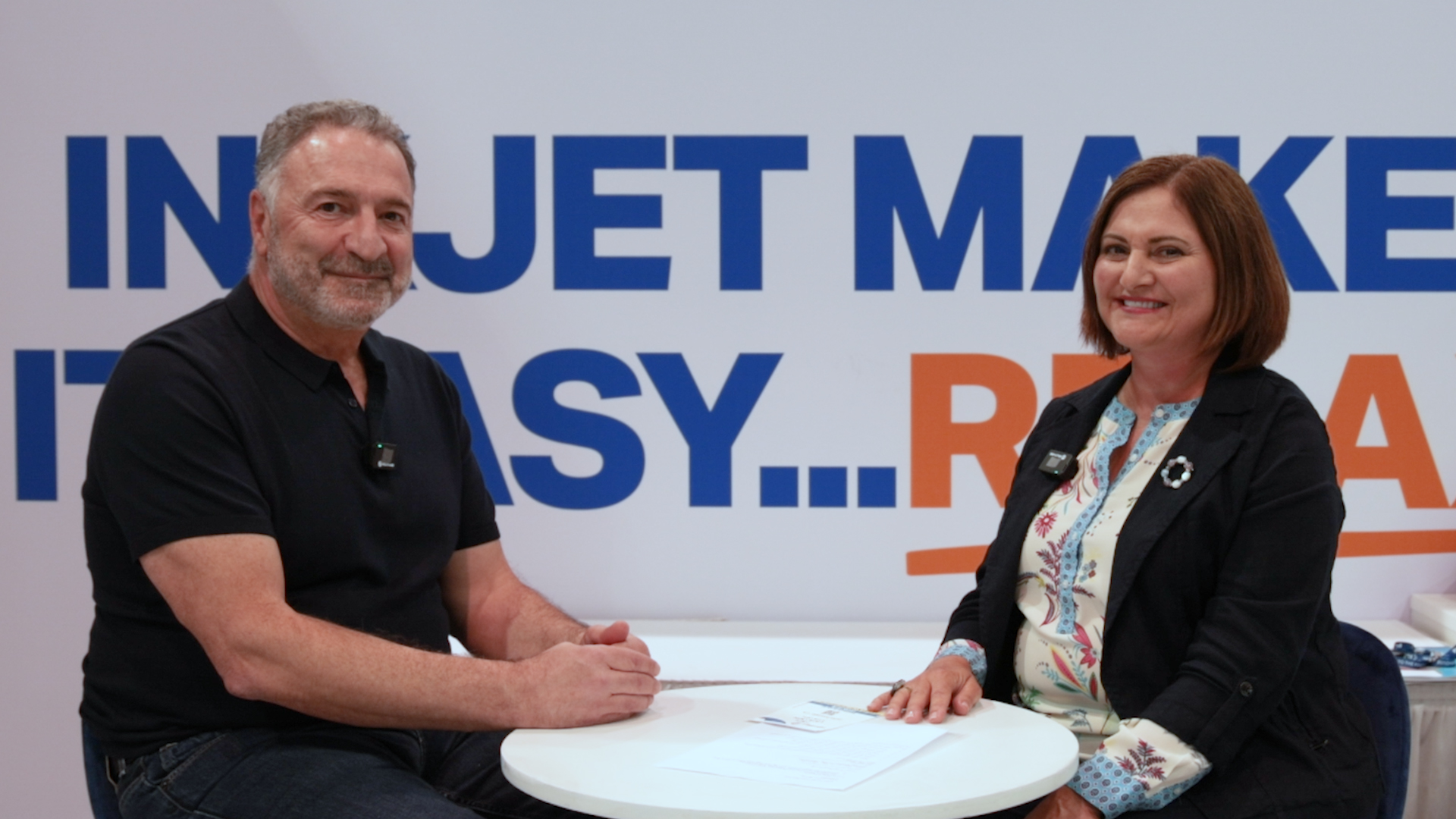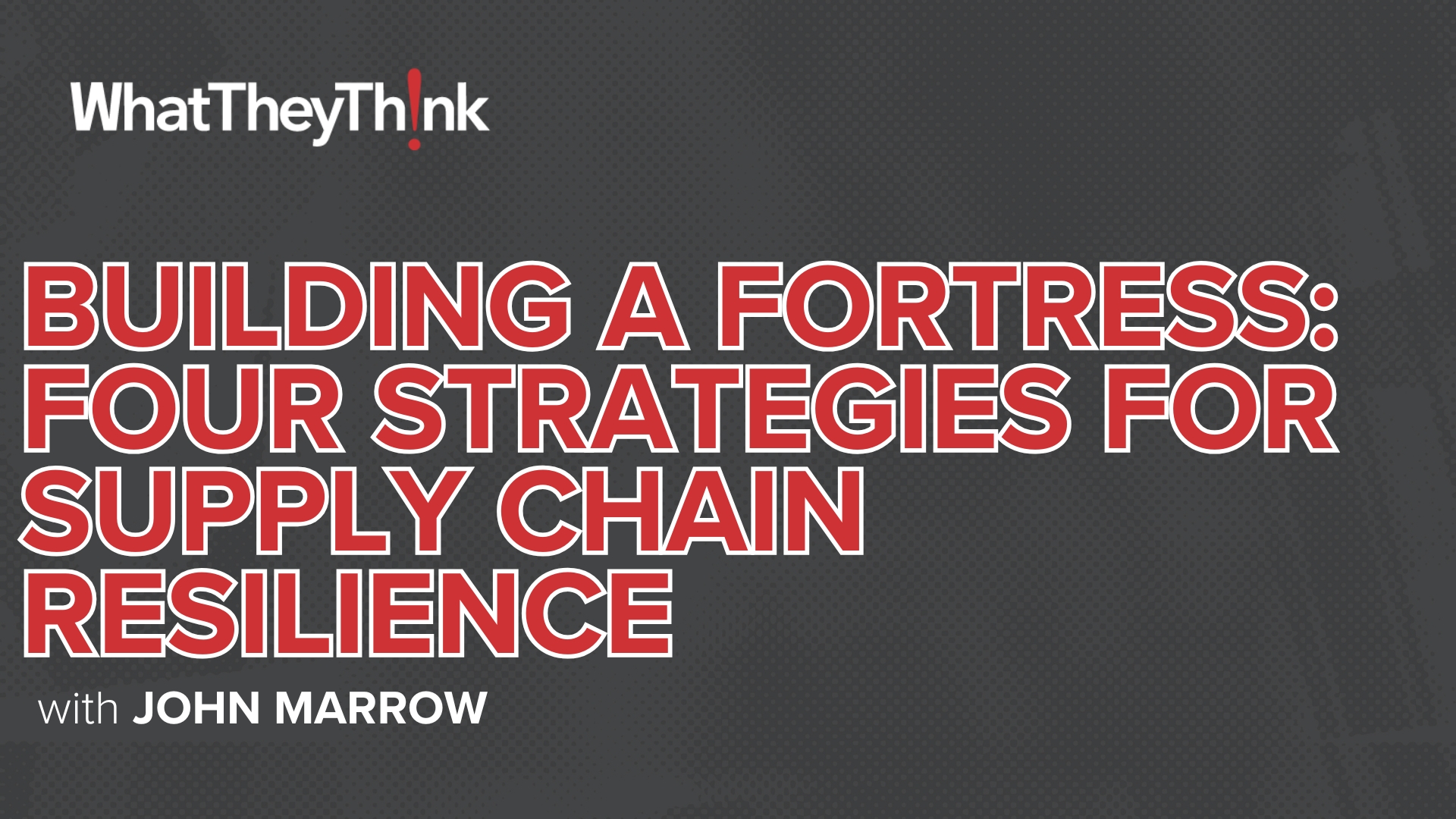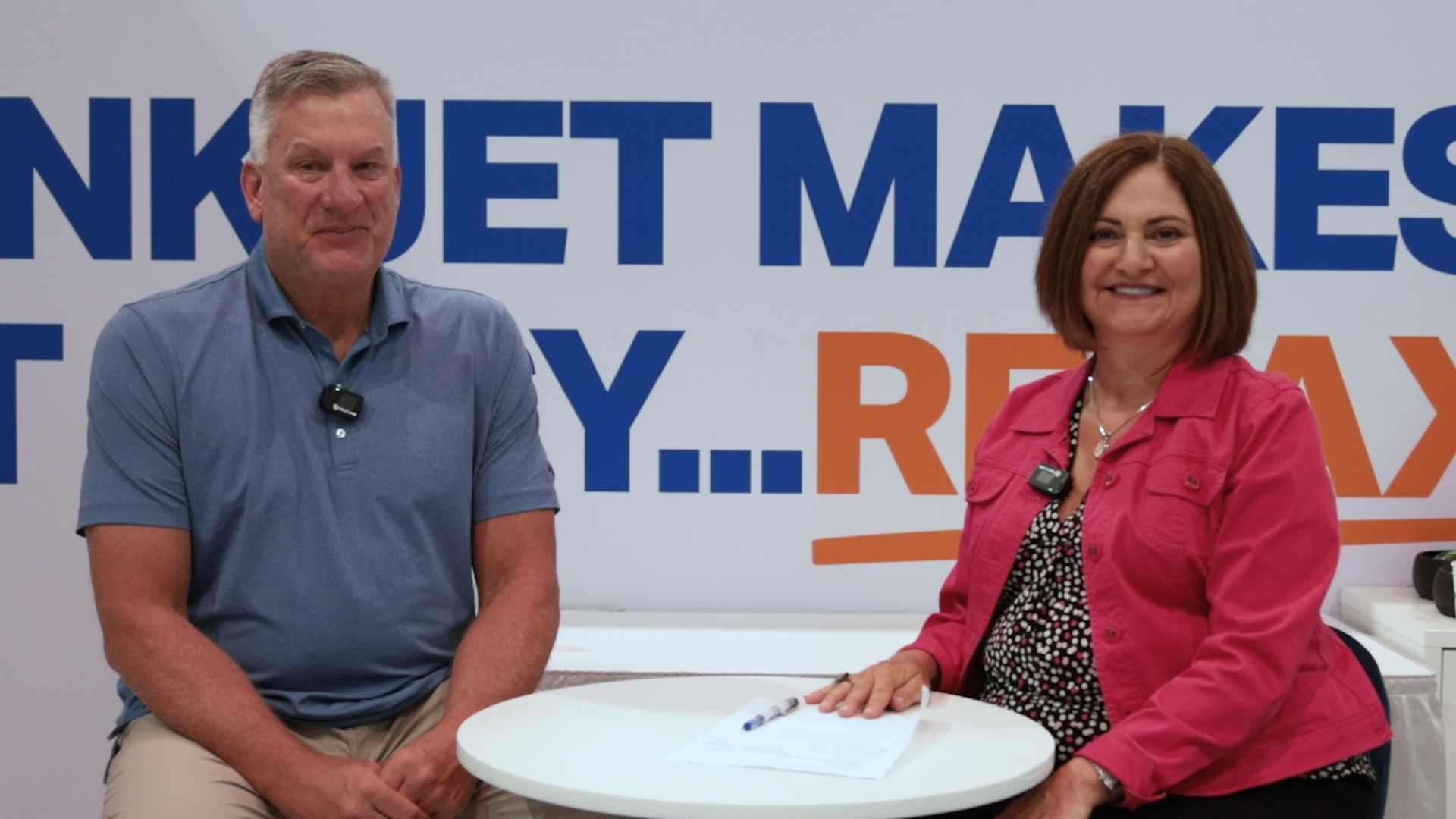Commentary & Analysis
Displaying 451-550 of thousands of articles
Insight You Need. Analysis You Trust.
Get the trusted insights you need to understand our evolving industry and emerging trends. Become a Premium Member.
Automation in Digital Textile Printing: A Cautionary Tale from “The Twilight Zone”
In the ever-evolving landscape of digital textile printing technology, our industry has witnessed a transformative wave of automation. This shift towards automated processes has certainly revolutionized production, but it also drew intriguing parallels to ideas from the past. This article explores how an old episode of “The Twilight Zone” teaches a still-relevant lesson about automation and the future of manual labor.
Road to drupa: Digital Packaging Printing Trends 2024
As part of our “Road to drupa” coverage, Marco Boer of IT Strategies looks at the current status of digital printing of packaging, the benefits it can provide for converters, and what to look for in Düsseldorf.
Impact of Western Sanctions on the Russian Printing Industry
After almost two years of embargoes, the Russian printing industry is doing much better than expected. Inkjet Insight contributor Oleg Litvinov looks at the state of the Russian printing industry since the onset of the war.
Three Case Studies in Integrating Contact Management with Segmented Email Marketing
In marketing, we talk about segmentation. We talk about contact management. We don’t often talk about how important it is to use the two together. Heidi Tolliver-Walker documents three examples that showcase just how powerful the transition from a nonintegrated to an integrated solution can be.
Ensuring Packaging Meets Accurate Color Expectations: Remotely
Controlled digital proofing systems that ensure proper setup and maintenance with each of the stakeholders have a corresponding system seems to be the answer. While there were a number of systems introduced that endeavored to achieve that goal, most never seemed to be able to maintain that needed level of control across the stakeholder teams—until now.
Road to drupa Production Continuous Feed Inkjet Trends 2024
As part of our “Road to drupa” coverage, Marco Boer of IT Strategies looks at current trends impacting the continuous-feed production inkjet market, and what to look for in Düsseldorf.
Print & Embellishment: Print Logistic Is Unleashing the Power of Coloreel Embroidery Technology
Many companies prefer the quality of embroidery for apparel and other items over various print technologies. But as logos and other decorations get more complicated, it can be difficult to reproduce them with conventional embroidery equipment. Enter Coloreel, on-demand dyeing of thread that enables production of even the most complex designs using a single embroidery head! In this article, provided compliments of textiles expert and WhatTheyThink contributor Debbie McKeegan, read the Print Logistic story as it proudly unveils this cutting-edge technology that is reshaping textile decoration.
January Shipments: Back to Normal?
January 2024 shipments came in at $7.04 billion, up from December’s $6.94 billion—and right between January 2021 and 2022.
Around the Web: Comic Creation. City Signage. New Knitting. Light Logic. Pork Parasite. Montana Monsters. Coors’ Calendar.
A new book explores how comics were made. A video tour of Manhattan signs. A new way of producing clothing requires only one size. “Agatha Christie: surfer dude.” Point Nemo: the place on Earth that is the farthest from dry land. Why it no long matters if you leave lights on when you leave a room. Yikes: a guy developed a parasitic infection in his brain after eating undercooked bacon. “Montana man pleads guilty to creating massive franken-sheep with cloned animal parts.” Coors Light’s 21-day “advent-inspired” calendar for March Madness. All that and more in WhatTheyThink’s weekly Kate-Middleton-Photoshop-scandal-free miscellany.
Can an Innovative Cleaning Method Reduce the Total Cost of Ownership in Digital Label Printing?
Ink consumption is one of the variable costs in digital printing. It varies from job to job and often sets the economic limits for the process. Guest contributor Dieter Finna of pack.consult looks at the newly developed, contact-free cleaning system used in the Gallus One. Is the reduction in ink consumption so significant that the total cost of ownership is also reduced?
Learning Dual Awareness/Achieving Adaptive Capacity
The ability to adapt to VUCA conditions is critical to 21st century leadership success. Wayne Lynn explains how learning Dual Awareness is a major step toward adaptive leadership and, especially, making decisions quickly in a developing crisis.
Road to drupa: Cut-Sheet Production Inkjet Trends 2024
As part of our “Road to drupa” coverage, Marco Boer of IT Strategies looks at current trends impacting the cut-sheet production inkjet market, and what to look for in Düsseldorf at drupa 2024.
6 Non-Price Ways to Create Competitive Differentiation in Print
What makes a customer loyal to a product or service? Heidi Tolliver-Walker explains how it’s not always price.
Are You Ready For the Hackers and Phishers?
Today, it takes more than some commercial firewall tools and virus protection license to keep your business safe. If you haven’t done a comprehensive security review in the last six months, take the time to do it now. If you are held for ransom, there may not be a road back.
Can the Senate’s Americas Act Help Make Fashion More Sustainable?
A bipartisan bill introduced in the U.S. Senate is designed to “establish a regional trade, investment, and people-to-people partnership of countries in the Western Hemisphere to stimulate growth and integration through viable long-term private sector development,” according to an article published in The Sourcing Journal. Perhaps its unique incentive-based approach, rather than the penalty-oriented regulatory compliance approach more often used in these types of legislation, will encourage brands and retailers to jump on board faster. This article outlines key elements of the bill, including both challenges and opportunities in terms of getting it signed into law and implemented.
“Other” Publishing Establishments—2010–2021
According to the latest edition of County Business Patterns, in 2021 there were 839 establishments in NAICS 51119 (Other Publishers). This represents a net decrease of 18% since 2010, but a 26% increase in the past year. In macro news, Q4 GDP was revised down slightly.
Around the Web: Font Films. Inked Intelligence. Decimal Discovery. Clever Clutch. Dog Data. Fruity Footwear. Thwarted Thief. Awful Offices. Fish Finder.
“This Year’s Best Picture Oscar Nominees as Typefaces.” Trial biking world champion Dougie Lampkin pays a high-octane visit to the shop printing his autobiography. A modified typewriter that uses ChatGPT to answer queries that are manually typed in. A graphene-based handbag with a fingerprint opening system. Yes, there is now Strava for dogs. For National Cereal Day, Post teamed up with Nike and LeBron James to develop Fruity Pebbles-themed sneakers. A would-be car thief’s failed attempt to steal a self-driving taxi. Has it been 25 years since the “Office Space” was released? What plastic surgery procedure is the most popular in your state? Busch Light teams (or teems) with Plenty of Fish to help fish lovers find a date. All that and more in WhatTheyThink’s weekly miscellany.
The Target Report: Stationers in Turmoil—February 2024 M&A Activity
Fedrigoni Acquires Mohawk Papers & Shutters Crane, and more…
Direct Mail in a Digital World: Personalization and Specialty Print Pave the Way
A resent study of print demand in key vertical industries found the transition to digital is undeniable, but direct mail remains an important component of modern messaging campaigns. This article explores how personalization and specialty print can further increase the efficacy of direct mail.
Printing Outlook 2024: Whither AI?
WhatTheyThink’s annual Printing Outlook report is now available. One of the many topics we cover in this year’s report is so-called “artificial intelligence.” To what extent is it on printers’ radars?
Don’t Just Slap “Marketing” on a Salesperson’s Title and Hope for the Best: A Conversation with Patrick Whelan
Heidi Tolliver-Walker talks with Patrick Whelan, founder of Great Reach Communications, about the distinction between sales and marketing, and why so many printers are losing sales without realizing it.
We Love Fast Inkjet—Part 1
Everyone loves a productive press. With inkjet vying to take more volume away from traditional presses, color and image quality are yesterday’s problem. Today, the challenge is to go faster and faster. In Part 1 of a two-part series, Inkjet Insight’s Elizabeth Gooding explains what it takes to get that next bit of incremental productivity out of an inkjet press.
My Father’s World Expands Home Curriculum Production with Affordable Color
In this article, sponsored by Kyocera, Pat McGrew looks at content publishing in the educational market, and how it comes with challenges that are not faced in most other markets. The demand for high-quality print is the same, but the print runs can be very short, and the requirement for substrates ranges from light to heavy across production needs. Add the need for engaging color, and it is clear why more content publishers like My Father’s World are turning to the Kyocera TASKalfa Pro 15000.
Textile Industry Transformation: Members of the EU Vote in Favor of Implementing New Rules on Textile Waste
Currently, around 78% of post-consumer textile waste ends up either incinerated or in landfills. The European Union has taken steps to regulate textile waste. In this article, compliments of textiles expert and WhatTheyThink contributor Debbie McKeegan, the Texintel team documents how textile waste is adversely affecting the environment and the goal of the proposed regulations.
December Shipments: Ending the Year on a Low Note
December 2023 shipments came in at $6.98 billion, down from November’s $7.24 billion—and, alas, the lowest of the year.
Around the Web: Zine Zone. Typewriter Tune. Neat Notes. Warm Walls. Apocalypse Averted? Apocalypse Aroma. Virtual Velvet. Hole Heading. Packing Prawns? Sub Storage.
A Brooklyn Museum exhibition looks at the history of “zines.” Ukrainian type foundry produces faces that reflect Ukraine’s Soviet history as well as the current war. Judas! The Boston Typewriter Orchestra has gone electric. Turn any paper into a sticky note. Graphene-enhanced infrared wallpaper for efficient home heating. Learn all about piphilology in time for pi day. Will AI wipe out humanity? A perfume based on all the smells indicated in the Book of Revelation. Laurie Anderson uses AI to “communicate” with late husband Lou Reed. New app always points to supermassive black hole at the center of the galaxy, very helpful for navigation. Le Sac Swoosh is a not very useful designer handbag shaped like Nike’s iconic branding. Subway has developed a tote bag for storing footlongs. All that and more in WhatTheyThink’s weekly miscellany.
The Display Graphics Evolution: Epson
This is the first in a series of articles that looks at the evolution of equipment manufacturers and their portfolios in the display graphics space. First up: Epson.
Heimtextil Highlights Powerful Innovations and Material Shifts for the Décor Industry
It seems that digital printing for fashion has stalled somewhat, but on-demand printing is emerging as a game-changer in home décor. In this article, provided compliments of textiles expert and WhatTheyThink contributor Debbie McKeegan, the Texintel team shares insights gained from experts within the textile supply chain during Heimtextil, held in Frankfurt, Germany, in January.
Is It Time to Unify Your Print Room?
As PSPs diversify their businesses, they are managing a range of job types across different digital printing technologies from multiple vendors. In this article, sponsored by Fiery, John Henze from Fiery discusses how PSPs can embrace diversification and create a unified print room by leveraging RIP software.
Deliberate Calm
Deliberate calm is the mindset necessary to make smart, effective decisions in the VUCA (volatility, uncertainty, complexity, and ambiguity) world we live in. Decisions made in this context require Dual Awareness, combining self-awareness and situational awareness. Wayne Lynn explains how.
The Printing Industry’s Marketing Achilles Heel
Despite all the doom and gloom we often hear in the news, key economic indicators are strong. Unemployment is historically low, and consumer spending is historically high. This combination, combined with other strong economic indicators, are driving the need for advertising and marketing which, in turn, is driving volume on the production floor. Heidi Tolliver-Walker explains how, with fewer print businesses to handle this volume, this can create a false sense of security among printers that marketing isn’t necessary.
3 Considerations When Buying Software
There is a cycle to software development that is intended to capture market or customer needs, develop solutions that meet those needs, and then launch into customer use. As more workflow automation tools and platform integration options come to market, consider having a different type of conversation with your vendors to understand the mindset behind the offering. The goal is to learn if their design and architecture are consistent with the needs of your shop.
Compact, High-Quality Label Printing with the SnapPress LP-1
The market for packaging printing, and especially labels, is gravitating towards digital print. European section editor and Inkjet Insight contributor Ralf Schlözer looks at a new entrant in the digital label space: SnapPress and the SnapPress LP-1 inkjet label printer.
Colorchrome Atlanta Is 41—and Still Growing
WhatTheyThink Films recently completed its documentary on Atlanta’s Colorchrome. Read more about what can be considered the quintessential family printing business.
Directory and Mailing List Publishing Establishments—2010–2021
According to the latest edition of County Business Patterns, in 2021 there were 548 establishments in NAICS 51114 (Directory and Mailing List Publishers). This represents a decrease of 67% since 2010. In macro news, retail sales dipped slightly in January.
Around the Web: Type Trends. Treacle Transformation. Tag Tampering. Petabit Packing. Suitcase Squishing. Meat Monitoring. Runaway Roomba. Door Dilemmas.
The latest Monotype Type Trends Report is now available. A company that has not changed its brand in 140 years…is changing its brand. A new antitampering tag can “reveal with near-perfect accuracy whether an item is real or fake.” Fitting one petabit of data on a DVD-sized optical disc. Using a 150-ton hydraulic press to compress a week’s worth of clothes into a carry-on suitcase. A chess set with pieces made of candles. New graphene-based sensors accurately test meat freshness. A household’s Roomba runs away from home. Friday meal options for Lent. All that and more in WhatTheyThink’s weekly miscellany.
“Hipstorical”—Not a Trend, But a Movement Towards Sustainable Printed Textile Design
Print needs to wow but still look amazing as trends come and go. In this article, authored by Cheryl O’Meara of Print Pattern Archive and provided compliments of textiles expert and WhatTheyThink contributor Debbie McKeegan, O’Meara explains how Print Pattern Archive’s Hipstorical initiative, with designers and print teams, is contributing to a circular economy. As part of the initiative, the group leveraged generative artificial intelligence (gen AI), playing with ancient techniques like batik and drawing inspiration from its incredible archive. A world first in design mash up with analog and digital riding shotgun! A terrific example of how AI can springboard designers’ work, resulting in even more spectacular results in a shorter timeframe.
The Print Label Market: Strategies for Success and Key Considerations
The advent of digital press technology has created new avenues for label production, delivering numerous advantages over traditional printing methods. With shorter lead times, lower quantities per order, and a growing demand for competitive prices, digital press technology is swiftly gaining popularity. This article explores the print label market and offers strategies for successful participation.
Today’s State of Greenwashing? Too Easy and Too Common
Greenwashing has become far more common than many might think. In the United States, 70% of companies admit to doing it. But the consequences can be serious. Here’s a quick survey of the state of greenwashing today and why it’s so important to back up your environmental claims.
drupa 2024: Can You Really Afford to Miss It?
When many in print and converting production and technologies around the globe get together, one of the discussions usually goes something like this: “How many drupa events have you been to?” or, “what was your first drupa?” There must be a good reason for that! David Zwang talks with Sabine Geldermann, Director drupa, Portfolio Print Technologies, Messe Düsseldorf, to discuss the upcoming drupa 2024 itself and the various regional events leading up to it.
Trends in Online Print in Europe
Just as the whole printing industry had a rollercoaster ride during and after the pandemic, so did online print. 2023 should have seen somewhat steadier waters. European section editor Ralf Schlözer reports on Zipcon CEO Bernd Zipper’s experience and expectations.
January Graphic Arts Employment Generally Flat
Overall printing employment in January 2024 was unchanged from December, with production employment up 0.7%, while non-production employment was down -1.3%.
Around the Web: Type Tech. Guessing Game. Photo Filing. Dimensional Details. Bird Blower. Carrot Concerts. Rotation Reasoning. Escalator Exhibit. Breakfast Buddy.
Monotype’s new AI-powered font pairing tool. In the game TimeGuessr, determine where and when an old news photograph was taken. And how were old news photos transmitted back in the day? Some examples of 3D printing in action. AI-driven eyeglasses. Retired payphone plays bird calls. An Ohio funeral home will preserve the tattoos of the deceased. When in Austria, be sure to catch the Vienna Vegetable Orchestra. What would happen if the Earth suddenly stopped rotating? When in Vilnius, Lithuania, be sure to check out the Escalator Slide. The inventor of Pop-Tarts has passed away. All that and more in WhatTheyThink’s weekly miscellany.
Embracing Digital Transformation in Fashion: The Path to Revolutionizing the Industry
The fashion industry’s hesitant embrace of Digital Product Creation (DPC) and 3D technologies is a paradox, given the clear advantages they offer. While large conglomerates may dive headfirst into this digital renaissance, small to medium-sized enterprises (SMEs) often linger at the starting line, bogged down by a complex web of concerns and challenges. This article, compliments of textiles expert and WhatTheyThink contributor Debbie McKeegan, and written by Lui Larocheski, explains why there is a reluctance to change and how the barriers can be broken down to eliminate much of the harmful effect the fashion industry has on the environment.
Increasing Awareness About Specialty Print
Ongoing technological advancements have given rise to a new generation of printed products that are more interactive and engaging than ever before, but customers aren’t always thinking about what’s new in the print technology world. Even if PSPs announce that they’ve acquired a new device or technology, their prospects and customers will rarely consider what that acquisition might mean for their printing needs. This article explores ways to bring more awareness to the upsides of specialty printing.
A Process for Strengthening Problem Behavior
Wayne Lynn looks at how paradoxical imbalances cause self-defeating behaviors when stress builds beyond manageable levels, presenting problems for leaders in maintaining the trust and support of subordinates.
(Somewhat) Conflicting Views on Consumer Attitudes Toward Sustainable Packaging
Heidi Tolliver-Walker takes a look at a recent studies gauging consumers’ attitudes toward sustainable packaging. Spoiler alert: they are willing to pay more for it.
More Privacy Laws Mean More Disclaimers!
No one goes into the print business, or the eDelivery business, to become a lawyer, but it almost takes a law degree to keep up with the growing body of legislation impacting the industry. Here is a quick look at new legislation from Illinois! Remember, always consult your legal counsel before making decisions!
Atomyx Could Change the Way We Do Print
Imagine a cloud-based platform that could both streamline the print business and production processes, while also reducing the skills needed to implement a plant-wide automation integration. While still in the early stages of development, that is the goal of the Atomyx platform.
Fujifilm Goes Big
After previewing it at PRINTING United in 2023, Fujifilm has officially launched the Revoria Press GC12500, the first dry toner B2 press. European section editor Ralf Schlözer provides the details.
University of Toronto Research Offers Promising Solution for Microplastic Shedding
There has been much discussion about the damage caused by microplastic shedding during washing of synthetic fabrics. Much of the focus has been on trying to trap these microfibers prior to their entering our waterways. But now promising research out of the University of Toronto offers a potential alternative to prevent, or at least mitigate, shedding in the first place.
Johnson's World: Getting Real About Artificial Intelligence
Depending upon who you ask, AI means either the beginning of the end for the human race’s domination of the world, or the elimination of all our jobs…or the debut of a really amazing and useful tool with almost limitless possibilities. Steve Johnson looks at how, in fact, it might be all three.
Tales from the Database: Looking at the Cloud from Both Sides
Drawing on eight years’ worth of Print Business Outlook surveys, our “Tales from the Database” series looks at historical data to see if we can glean any particular hardware, software, or business trends. This issue, we turn our attention to software—specifically, migration to the cloud.
Around the Web: Paper Paean. Dinero Dearth. Color Can. Dental Disaster? Road Recharging. Hovering Hose. Habitat Havoc. Beneficial Beavers. Pickle Paramour. Bowl Bonanza.
Author and paper maker Beth Kephart has written a love letter to paper. Are we seeing the end of cash? A “Graffiti Color Mixer” includes multiple colors in the same spray can. Were a fleet of electronic toothbrushes involved in a massive DDoS attack? Installing EV chargers in the roads themselves. A phone charger that only charges when your eyes are closed. Three words: flying fire hose. In Kenya, through a complex series of relationships, an invasive ant species is impacting lion hunting skills. The time beavers parachuted into Idaho. This Valentine’s Day, say it with pickles. DoorDash contest is giving away everything advertised during this Sunday’s Super Bowl. All that and more in WhatTheyThink’s weekly miscellany.
Beyond the Press: Revolutionizing Workflow for Digital Print Embellishments
Workflow software has connected the islands of prepress, printing, and binding/finishing into a seamless continuum. But how does workflow software apply to digital embellishments. Taktiful’s Kevin Abergel and Carlo Ruas take look at the current lay of the land.
Glitter is Not Green: Why Petroleum-Based Glitter Should Be Banned Worldwide
Cary Sherburne looks at the environmental hazards of glitter, the movements afoot to ban it, and sustainable alternatives that offer all the fun of glitter without the environmental downsides.
Rules Based Workflows: Connecting and Automating Processes to Fit Your Business Needs
Many of the current “off the shelf” workflow software and professional service offerings are being developed to support newer and disparate technologies and markets. Ultimately, solutions need to fit the specific needs of a PSP and their customer and partner relationships, and that’s where rules based workflows shine.
Potential Artificial Intelligence Use Cases for the Printing and Packaging Industry
It’s likely that in implementations by suppliers to the industry is where artificial intelligence (AI) will first show up in your business. Cary Sherburne spoke with a couple of industry executives from companies that are suppliers to the industry to understand what, if anything, they are doing or thinking about with respect to AI.
The Target Report: Paper-Based Journalism is Melting Away—January 2024 M&A Activity
Baltimore Sun Purchased, CherryRoad Media Acquires Page 1 Printers, and more…
The Key to Strategic Software Investments? Having a Process
Heidi Tolliver-Walker looks at how one particular print business—Atlanta’s Wise—got the most out of a print MIS implementation by developing a process for doing so and walks us through that process.
A Complete Reboot at Walker360 Results in Exponential Productivity Gains
Cary Sherburne explores how Walker360 completely restructured its production platform—and realized exponential productivity gains.
State of the Cloud: Leveraging Professional Services in 2024
Do you have tasks that are never completed? Is your tech stack out of date? Is software and hardware maintenance on the back burner because no one has time? Trying to get to the cloud, but struggling with your on-premise installations? Are you wondering if you are getting the best advice from your staff and vendor partners? Maybe you need professional services!
The Rise of AI in Marketing
Contributor Joanne Gore looks at the wide variety of uses for AI for marketers, and how AI can be integrated with traditional marketing channels.
State of the Cloud: Training Options in 2024
In days gone by, we had apprenticeships and vocational training to feed the print industry. Apprenticeships are a wonderful way to grow the talent of new employees and help them along a career path as they master the craftsmanship of print manufacturing. Vocational schools, state colleges, and vendor training also provide important educational resources. A growing option is cloud-based training to meet the needs of on-the-go trainees as they navigate the rigors of print in environments that increasingly rely on cloud services!
Software-Driven Workflows for Offset Production: Where From, and Where To
Many networked, automated production capabilities are now built into the operating systems of the latest digitally controlled offset presses, but there has been no universal movement toward adoption, and printers still need guidance about what workflow is, how to implement it, and how to make the best use of it. Contributor Patrick Henry looks at how building a software-based workflow for offset production starts with understanding how the idea of workflow originated and what functions and features it now consists of.
Executive Q&A: Baldwin Technology’s Patrick Keller
We spoke with Patrick Keller, Division President, Baldwin Technology Co., about the history of the company, its broad set of solutions for a vast array of industries, including many aspects of print, and how being part of the new BW Converting Group benefits the company and its customers.
Dealing with Dyes: Two Recent Developments Promise to Improve Textile Sustainability
Cary Sherburne looks at Mimaki’s Neo Chromato Process, a pilot project that removes ink dye-sublimated onto textiles, and a project underway in India that uses an aerogel adsorbent modified with graphene to remove trace pollutants from wastewater.
Kyocera Enters 2024 with Inkjet-Fueled Momentum
Kyocera has new presses, partnerships, and application segments helping to accelerate market penetration in 2024. However, the real story is the popularity and staying power of the first press they brought to market. In this article, sponsored by Kyocera Document Solutions America, Inc., Inkjet Insight’s Elizabeth Gooding looks at the market reaction to the TASKalfa Pro 15000c and previews the upcoming TASKalfa Pro 55000c.
Welcome to the Software Issue
This week, we are publishing the content from 2024's Issue 1, the Software Issue, with an emphasis on “the cloud” and so-called AI. In this article, a preview of the week’s content.
State of the Cloud: Looks Like Clear Skies Ahead!
As the cloud rapidly emerges as a key influencing technology, the integration of business and production management solutions into cloud-based platforms has become inevitable, and things are changing fast!
State of the Cloud: Zero Trust Workflows in 2024
It’s time to abandon your Trust but Verify approach to security. The changing legislative and technology landscapes demand a new approach to securing your shop, whether you print, e-deliver, or produce output across multiple channels. Zero Trust is the modern approach to your cloud-enabled workflow architecture.
How Your IT Infrastructure Affects the Value of Your Business
Contributor Jim Russell of New Direction Partners explains how a company’s technology infrastructure is an important consideration for a potential buyer.
Book Publishing Establishments—2010–2021
According to the latest edition of County Business Patterns, in 2021 there were 2,386 establishments in NAICS 51113 (Book Publishing). Although this represents a decrease of 20% since 2010, establishments ticked up by 29 establishments in 2021. In macro news, Q4 GDP grew 3.3%.
Around the Web: ’Hog History. Snowy Sobriquets. Acrobat Antics. Reading Realm. Cursive Comeback. Additive Aluminum. Desk Defacing. Funding Fest. Galaxies Galore. Pasta Pleasure.
Where did Groundhog Day come from? Taylor Drift conquers Minnesota. Is the maximum size of a PDF really “smaller than Germany”? Wales’ “Kingdom of Books.” Is E Ink finally ready for prime time? Cursive handwriting is starting to be taught again, for some reason. 3D printing using liquid metal. Casual vandalism is OK if you’re a Romantic poet. A round-up of some of the “good, bad, and weird stuff that was crowdfunded in 2023.” The James Webb Space Telescope captures 19 amazingly detailed spiral galaxies. “Eating pasta is scientifically proven to make you feel better.” All that and more in WhatTheyThink’s weekly miscellany.
The Year Digital Fashion Went Out of Style—What’s Next and How Does the Future of Digital Fashion Look
Was 2023 the year that digital fashion went out of style? This guest article, written by Dani Loftus of This Outfit Does Not Exist, is provided compliments of textiles expert and WhatTheyThink contributor Debbie McKeegan. Loftus notes that no matter how hard each player in our ecosystem worked, the past 12 months have seen the “hype” around Web3 fashion wane. And I myself have been wondering why the growth in digital fabric printing and other digital technologies in the world of textiles and apparel seem to have stalled when it seemed like there was so much potential, for the industry and the planet! Loftus provides a look at what went wrong.
AI Is What Really Drives Marketing: Now You Can Engage!
Marketing AI is the process of using AI capabilities like data collection, data-driven analysis, natural language processing (NLP), and machine learning (ML) to deliver customer insights and automate critical marketing decisions. In the past, this technology has been relegated to those who can afford to build it. Now Boostt.ai (formerly known as Geofactor.com), has developed a platform for bringing Marketing AI to the masses.
Global Ad Market: “I’m Back!”
After experiencing a steady decline in the global advertising market over the past several years, final numbers on global ad spending are projected to show growth for 2023—and not just growth, but significant growth. Heidi Tolliver-Walker digs into the numbers.
Three Projects to Start 2024
The life of a printer is a whirlwind of incoming jobs, production, and delivery. It’s hard to find time to look for new ways to conquer production demands. Here are three projects you can execute with your team to identify new options to set your business up. We know that 2024 will be a big print year. Get your share of the business!
The Secret to Inkjet Success Is in the Inks—and Primers
Inkjet is the main driver of the printing industry's transition from traditional printing processes to digital. The discussion often revolves around press architectures, print heads and technical aspects of the hardware, while inks and supporting fluids tend to be treated as secondary issues. This article, written and sponsored by Kodak, looks at how inks and primers have a significant impact on color quality, cost-effectiveness and sustainability of the jobs produced, as well as the variety of applications.
3 Critical Components of Inkjet Innovation
Is innovation just new technology or is there more to it? Inkjet Insight guest contributor Kelly Lawrence looks at how a true innovation requires a commercialized technology or capability, market desire, and market viability. Ask yourself, what percentage of your new products and services are truly innovations?
November Shipments: Tis the Season…
November 2023 shipments came in at $7.24 billion, down from the year’s high of $7.76 billion a month earlier.
Around the Web: Type Testing. Dramatic Displays. Migration Message. Balloon Ballyhoo. Glass Gloss. Sustainable Sabots. Snow Snacking. Fjord Facts. Piscine Prank. Unlikely Unguent.
A Monotype study aims to answer “questions about the cultural differences in perceiving meaning and emotion in type.” Chinese signmakers use infinity mirrors to create cool LED signage. A road sign in Canada wishes monarch butterflies a safe migration. “The golden age of ballooning” led to the first aerial maps. AR-based windows for tour buses. Auto-focusing eyeglasses! The graphene-based “Everything Proof Pants & Shirt.” 3D-printed compostable shoes. Torn from the headlines: is it safe to eat snow? Burning question: why does Norway have so many fjords? Puckish teenager tapes fish to ATMs, for some reason. Hidden Valley and Burt’s Bees collaborate on ranch-flavored lip balm, much to the bees’ dismay. All that and more in WhatTheyThink’s weekly miscellany.
The Evolving Roles and Responsibilities of the Textile Designer in a Changing Industry
In a world where business dynamics are changing in so many industries, textiles is certainly not immune. In this interview with Fulvio Alvisi, President of the Italian Textile Designers Association, provided compliments of textiles expert and WhatTheyThink contributor Debbie McKeegan, he discusses both the opportunities and challenges for future textile designers.
Keypoint Intelligence Releases New Vertical Market Research
At the end of 2023, Keypoint Intelligence completed a comprehensive multi-client study of print demand in key vertical industries. This survey serves as an update to similar research that was conducted in 2020. Over 1,200 respondents from businesses with 200+ employees participated in this study. This article provides a top-level overview of the key findings from this research.
Paradoxical Competencies
In the latest installment of his Smart Leader Insights series, Wayne Lynn looks at “paradoxical competencies,” which are key to predicting the behavior of individuals and teams, as well as effective performance as a leader.
8 Hilarious Examples of “You Gotta See It to Believe It” Packaging Fails
As we head into 2024, we all have to admit—we could use a little levity right now. There’s nothing to create levity like a good packaging fail. Here are eight hilarious examples of when the right prototype could have (or should have) saved the day.
Inkjet Integrators: An Introduction
In part one of an Inkjet Insight series, Ralf Schlözer begins an extensive look at “inkjet integrators,” providers of custom solutions for applications for which there are few or no commercial inkjet press solutions available.
Clothing Returns Are Killing Us!
Did you know that most of what you buy online and ship back as a return ends up in the landfill? It’s too expensive for most companies or their reverse logistics operators to put them back up for sale, so they just ship them off to the landfill. In this space, we have written a great deal about the evil effects of Fast Fashion, and this is just another one. I hope after reading this article, you will take a serious look at your buying habits. The truth is, we as consumers hold the power. If we stop buying Fast Fashion, and if we discontinue the detrimental practice of bracketing shopping, we can make a huge difference. Don’t know what bracketing shopping is or if you are guilty of it? Read on!
Periodical Publishing Establishments—2010–2021
According to the latest edition of County Business Patterns, in 2021 there were 4,315 establishments in NAICS 51112 (Periodical Publishing). This represents a decrease of 40% since 2010. In macro news, December retail sales were up from November.
Around the Web: Folio Fest. Cat Crates. Device Dilemma. Winter Wear. Hovering Haven. Breed Brief. Lavish Lego. Chicken Chatting. Winning Wings.
The Folger Library will be publicly exhibiting its collection of Shakespeare First Folios. A new, high-concept typeface based on meteorology. Why do cats love cardboard boxes (and should converters be targeting them)? Trying to figure out what the highly touted Rabbit R1 is actually used for. A wealthy Frenchwoman stipulated in her will that her money go to providing clothes for snowmen. A prototype for a floating umbrella that can follow you around and we want one. how did the dog breeds get their names? An artist whose chosen medium is black Lego. How to detect a chicken’s emotions, should you ever want to. Tito’s Vodka’s new “Spokescart.” Popeyes is offering free wings if a “winged” team—or the Bills—win the Super Bowl. All that and more in WhatTheyThink’s weekly miscellany.
Market Shifts and Emerging Trends Driving Change for the Print and Textile Community
In her latest article, textiles expert and WhatTheyThink contributor Debbie McKeegan points out that global events and shifting consumer behaviors continue to upend traditional business models across the supply chain. Whether technical or strategic—the textile industry must adapt and invest to minimize risk and reap the commercial benefits of technology. Only then can it strategically meet market demands and adapt at speed to address shifting consumer behaviors. Sustainability, supply chain volatility, consumer preferences, artificial intelligence and localized economic instability are all factors she discusses here.
Survey Says! Signage and Display Graphics in 2024
It’s that time again, time to sift through the data from our annual Business Outlook Survey for the forthcoming Printing Outlook report. As has become an annual tradition, we break out some display graphics-specific data to see what trends we can quantitatively gauge.
BookTok Driving Book Sales and Book Design
European section editor Ralf Schlözer looks at how BookTok, a Tiktok community where readers discuss, praise, rank, or showcase books via short video clips, has been driving book sales—and even book design.
Planning for Change, Succession Style
If you have watched the TV show Succession, or you have a vague understanding of it, you know that it is a tragedy. It is the story of a family trying to figure out how to move forward as the aging patriarch’s health fails and there is no clear path forward for the family business. If you own and operate a family business, even if you aren’t part of the family, succession planning should be reviewed every year. Things change. Here are some things to consider!
Turnover and Employment in Print in Europe—Croatia
This bi-weekly series of short articles aims to shed a spotlight on the size of the printing industry in Europe per country and how revenues and employment developed in 2020, when the pandemic impacted businesses. In this final installment, we look at Croatia, which ranks at number 19 among the printing industries by turnover in Europe.
First COP28, Now Davos
You are probably hearing a great deal about Davos in the media these days. This follows last year’s COP28 session, another gathering of world leaders and influencers discussing topics critical to pretty much everyone on the planet. In this article, we explain what “Davos” is and why it’s important. Full Disclosure: Google Bard helped me write this article.
Industry Notes Passing of Peter Crean, Digital Printing Pioneer
Patrick Henry looks back at the life of Xerox’s Peter Crean, one of the graphic communications industry’s most groundbreaking technologists, who passed away last month.
If You Buy Inkjet, New Customers Will Find You
Contributor Lois Ritarossi talks with three Screen customers about how inkjet has transformed their companies, why they continue to invest in new technology, and the impact on their customers.
October Shipments: Peak Performance
October 2023 printing shipments came in at $7.84 billion, up from September’s $7.37 billion.
Around the Web: Clever Collage. Cover Creation. Letter Lovers. Punctuation People. Tech Table. New Nostalgia. Air App. Phantom Fight. Dog Drivers. Gum Gone.
A Sgt. Pepper-esque tribute to the celebrities who passed away in 2023. Behind some book cover redesigns from hardcover to paperback. A Minneapolis store where you can buy vintage, discarded channel letters. A fun 1824 primer on punctuation. A coffee table that is also a touchscreen display. “What was life like before the Internet?” A start-up is developing an app that lets a smartphone evaluate air quality. Graphene-based batteries now for pre-sale! The economics of time travel. Protesting Pontianak, Indonesia’s proposed “ghost statue.” Oscar Mayer is hiring Wienermobile drivers. Fruit Stripe gum has been discontinued. All that and more in WhatTheyThink’s weekly miscellany.
- Questions to ask about inkjet for corrugated packaging
- Can Chinese OEMs challenge Western manufacturers?
- The #1 Question When Selling Inkjet
- Integrator perspective on Konica Minolta printheads
- Surfing the Waves of Inkjet
- Kyocera Nixka talks inkjet integration trends
- B2B Customer Tours
- Keeping Inkjet Tickled Pink
© 2024 WhatTheyThink. All Rights Reserved.














